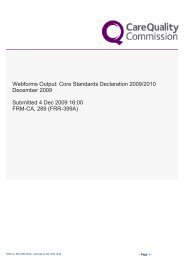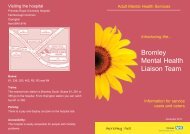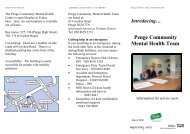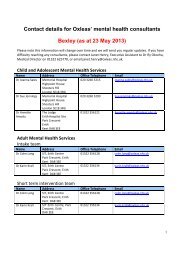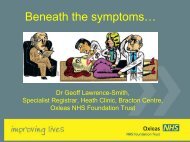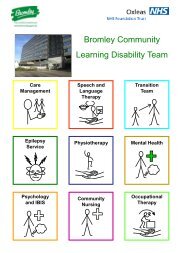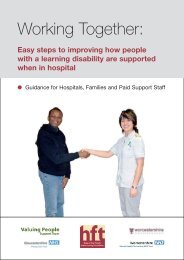Incident Management Policy and Procedure 652.0 KB - Oxleas NHS ...
Incident Management Policy and Procedure 652.0 KB - Oxleas NHS ...
Incident Management Policy and Procedure 652.0 KB - Oxleas NHS ...
You also want an ePaper? Increase the reach of your titles
YUMPU automatically turns print PDFs into web optimized ePapers that Google loves.
Criminal InvestigationStaff are most likely to be asked to provide evidence to the Police following an incident suspected ofcrime which involved a service user, a visitor or another member of staff.Officers will request statements from directly involved staff very quickly after the incident <strong>and</strong> evidenceis gathered by interviewing the member of staff. Any interview which not held under caution areclassed as informal <strong>and</strong> can be held at the Trust premises. The Trust wishes to co-operate as fully aspossible with such investigations <strong>and</strong> urges staff to make themselves available if requested.If however the Police request an interview with a member of staff under caution, this amounts to aformal interview <strong>and</strong> it is imperative that advice is obtained. For informal interview it is permissible fora colleague to be present for support, <strong>and</strong> depending on the nature of the incident, it is sometimesappropriate to have the Trust legal representative present. Each case can be considered on its ownmerits. When a request is forthcoming, this issue should be discussed with the Director or LegalServices Manager.Where health professionals belong to a Defence Union, Trade Union or a professional organisation,they may also wish to consult them or obtain their own legal advice.In all cases it is permissible for members of staff to be given time to gather their thoughts <strong>and</strong>therefore defer an interview, to allow the member of staff to access the relevant documentation suchas patient records, or for legal representation to be arranged.Police interviewsFor police interviews the usual procedure is that the Police Officer will have a face to face interviewwith the member of staff <strong>and</strong> will h<strong>and</strong>write the statement on a st<strong>and</strong>ard form which the member ofstaff will then be asked to read, check, <strong>and</strong> make any amendments. The amendments are initialed<strong>and</strong> the member of staff will then be asked to approve the statement <strong>and</strong> sign the statement of truth atthe end of each page of the statement.It is imperative that the member of staff is content that the h<strong>and</strong>written statement as transcribed by thePolice Officer is a true reflection of what was said in the interview, as this will st<strong>and</strong> as that member ofstaff’s evidence in any forthcoming criminal trial. The Police are often reluctant to permit copies ofstatements to be kept by the witnesses, but it is permissible to request a copy at the time of signing,on the basis that this will be kept confidential.What to put in your reportDocuments produced during the investigation of an adverse incident are not ‘privileged’. This meansthat in any subsequent legal case, the patient’s legal advisor will be able to obtain them from the Trust.It is important that you remember that a report you make as part of incident reporting system orcomplaint may not remain confidential.You must ensure that you have included:Your Full nameQualifications <strong>and</strong> brief details of your relevant experienceDetails of the post you hold <strong>and</strong> your job location ie wardState the time you started <strong>and</strong> finished your duty on the day(s) in question(see profoma)48





